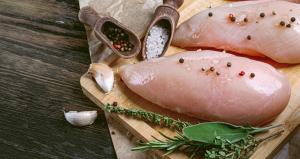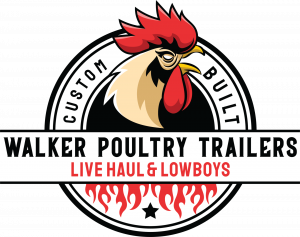Winter Poultry Transport: Planning Ahead to Avoid Cold-Stress in Transit
Transport conditions can either protect or endanger a flock...Design and timing make all the difference once temperatures start dropping”
PHILADELPHIA, MS, UNITED STATES, October 28, 2025 /EINPresswire.com/ -- As temperatures drop across the southern poultry belt, maintaining bird welfare during transport becomes a critical operational concern. Cold-stress during live haul not only affects flock health but can also lead to weight loss, bruising, and reduced overall quality before processing. Effective transport planning—combined with the right trailer design—plays a decisive role in preventing avoidable losses during the winter season.— Dwayne Walker
For poultry producers in major states such as North Carolina, Georgia, Arkansas, Alabama, Texas, and Mississippi, winter preparation means evaluating hauling equipment just as carefully as feed schedules or facility temperatures. According to Dwayne Walker, founder of Walker Poultry Trailers, attention to airflow, insulation, and timing during colder months determines how well birds endure the journey. “Transport conditions can either protect or endanger a flock,” Walker said. “Design and timing make all the difference once temperatures start dropping.”
The Hidden Impact of Cold-Stress
Poultry transport during cold weather presents challenges that extend beyond visible frost or wind. Chickens and turkeys are particularly vulnerable to temperature fluctuations because of their high metabolic rate and limited ability to regulate body heat under stress. During transit, exposure to wind chill or poorly distributed ventilation can cause hypothermia in outer cage rows even when central loads remain warm.
Cold-stressed birds expend additional energy maintaining body temperature, which directly translates to lower live weights and increased mortality. The stress response also leads to muscle contraction and potential bruising—factors that reduce carcass quality upon arrival.
Once cold-stress sets in, the damage is irreversible. Preventing it begins with equipment engineered to maintain consistent airflow while shielding birds from direct exposure to freezing winds.
Equipment Design: The Foundation of Welfare in Transit
Specialized poultry live haul trailers are designed to balance two key needs—ventilation and protection. During warmer months, maximum airflow prevents overheating. In colder conditions, that same airflow must be controlled to retain heat without creating pockets of still, humid air.
Modern trailer systems achieve this through adjustable side panels, optimized vent placement, and weather-resistant barriers. By allowing precise control of air exchange, these systems reduce wind chill while maintaining oxygen flow throughout the load.
Another critical design feature involves uniform stacking and spacing. Even distribution of crates and airflow prevents cold zones in external rows and hot spots in interior sections. A well-constructed live haul trailer ensures that every bird, regardless of position, receives stable environmental conditions throughout transport.
The Role of Material and Construction Quality
Temperature resilience begins with the trailer’s build itself. Aluminum construction offers lightweight efficiency but requires reinforced framing to handle winter expansion and contraction. Stainless steel hardware resists corrosion from moisture and de-icing agents, extending the trailer’s lifespan.
Insulated side walls, removable weather panels, and sealed joints prevent direct airflow infiltration while still allowing operators to adjust ventilation manually when weather conditions change mid-route. Proper drainage channels also help remove melted ice and moisture that could refreeze during long hauls.
Precision manufacturing and structural integrity ensure that no unexpected drafts or leaks compromise the load’s internal climate.
Operational Timing and Route Coordination
Even the best trailer design cannot overcome poor logistics. Timing transport operations around temperature forecasts, daylight cycles, and facility schedules is essential during winter months.
Departing during the warmest part of the day minimizes exposure to subfreezing temperatures. Coordinating arrival times with plant intake avoids unnecessary waiting periods when trailers remain stationary and ventilation is reduced.
Adjusting bird density inside crates also helps manage internal heat levels. Slightly tighter packing—within welfare standards—can help birds retain collective warmth during extreme cold, while excessive crowding risks suffocation or injury.
Route optimization reduces overall transit time and exposure risk. Avoiding high-elevation routes or open stretches with wind exposure can further stabilize conditions.
The Economics of Prevention
Winter mortality rates in poultry transport can rise sharply without proper planning and equipment. Even small losses per load accumulate across thousands of birds, directly impacting profitability. Damaged carcasses, increased bruising, and condemnations at processing facilities compound financial impact.
A well-designed live haul trailer effectively reduces mortality, minimizes shrink loss, and improves uniformity at plant intake. While equipment investment requires upfront cost, it consistently yields measurable returns through reduced losses and improved animal welfare compliance.
Regulatory pressure and consumer scrutiny around livestock handling also make proper transport conditions a reputational necessity for large poultry producers. Demonstrating proactive measures against cold-stress supports both operational efficiency and public trust.
Regional Realities for Poultry Producers
The poultry-producing states of North Carolina, Georgia, Arkansas, Alabama, Texas, and Mississippi experience distinct climate shifts that demand region-specific transport strategies.
In the Carolinas and Georgia, winter temperatures can fluctuate rapidly between mild and freezing within hours, requiring adaptive ventilation systems. Arkansas and Alabama face higher humidity levels that exacerbate moisture buildup inside trailers. In Texas, sudden cold fronts combined with long-distance hauls create uneven exposure across regional routes. Mississippi, positioned between coastal and inland climates, contends with both cold wind exposure and damp conditions that freeze overnight.
Each region benefits from equipment built to adapt to those specific environmental challenges rather than relying on one-size-fits-all solutions.
Long-Term Planning for Winter Readiness
Effective winter transport planning extends beyond the hauling season. Regular maintenance during the off-season ensures all venting mechanisms, seals, and structural components remain functional when cold weather returns. Routine inspections of hinges, latches, and panel fittings prevent air leaks that could compromise temperature control.
Operators benefit from pre-season training that reinforces best practices for winter loading densities, handling techniques, and monitoring during transit. Combining technical preparation with trained personnel establishes consistent performance across routes and seasons.
Investing time in planning and preparation each year reduces emergency interventions and keeps both livestock and operations stable during unpredictable conditions.
A Shared Priority
Across the southern poultry industry, winter transport readiness represents both an animal welfare concern and an economic priority. Cold-stress prevention relies on equipment designed with precision, operated with awareness, and maintained with care.
For producers throughout North Carolina, Georgia, Arkansas, Alabama, Texas, and Mississippi, modern live haul trailers represent not only compliance but efficiency. Maintaining stable environmental conditions in transit ensures healthier birds, better yields, and fewer losses at the plant—all essential components of a sustainable poultry supply chain.
About Walker Poultry Trailers
Walker Poultry Trailers, based in Mississippi, manufactures and services custom-designed live haul trailers built for optimal airflow, durability, and adaptability across all climates. Founded by Dwayne Walker, the company serves poultry operations across the southern United States, focusing on reliability, welfare, and long-term performance in live bird transport.
Morgan Thomas
Rhino Digital, LLC
+1 504-875-5036
email us here
Visit us on social media:
Facebook
Legal Disclaimer:
EIN Presswire provides this news content "as is" without warranty of any kind. We do not accept any responsibility or liability for the accuracy, content, images, videos, licenses, completeness, legality, or reliability of the information contained in this article. If you have any complaints or copyright issues related to this article, kindly contact the author above.


